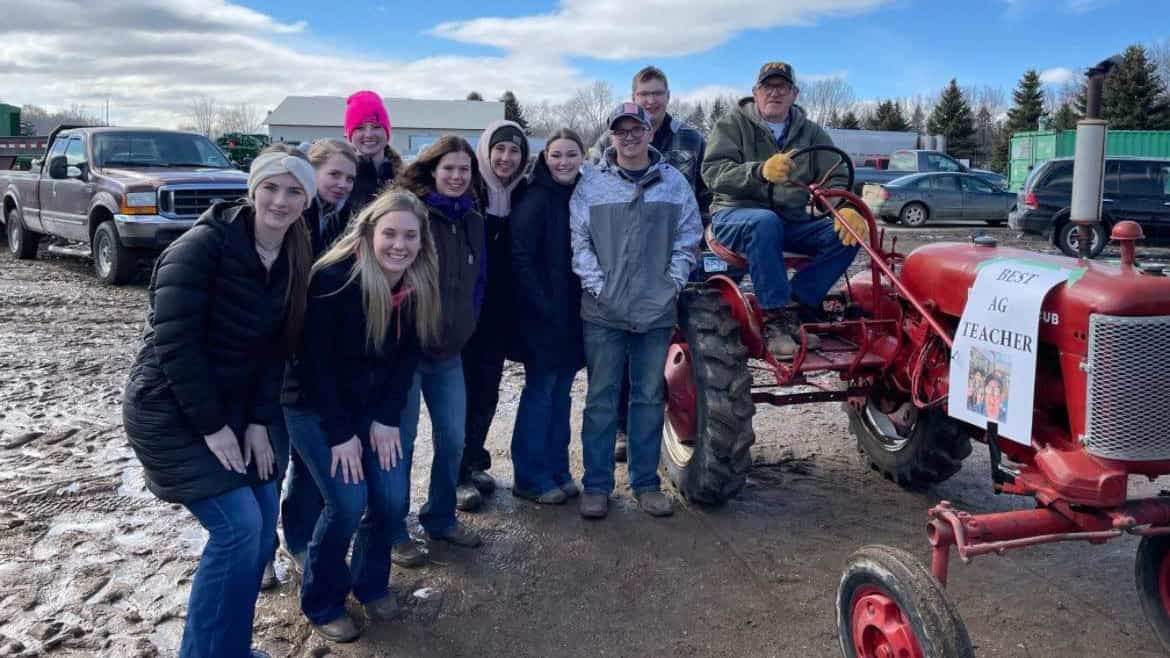Ed Terry decided as a 10th grader in the early 1960s that if he could not farm full-time right after high school, he wanted to become an agriculture teacher and FFA advisor. So that’s what he did.
Terry graduated from the University of Minnesota with an agricultural education degree in 1968 and took a job in Farmington, Minn. Six years later, his father retired from farming, creating opportunity for Terry and his brother, David, to farm together on the family land. They took it.
He assumed he would make a career out of growing crops and milking cows for the rest of his life. But in the summer of 1977, a school 10 miles away contacted him. They had students signed up for a new agriculture program but no teacher. Terry shared with them what it would take to get started, and soon they asked him to teach.
“I kept saying, ‘No, no, no, absolutely not,’” he recalls. He was busy with the farm. “But you know, in the back of my mind, I thought, These kids deserve a chance.”
After talking with his wife, Carol, and his brother, Terry decided he could give Randolph High School one year.
One year turned into two, and now, in 2022, Terry has retired at the age of 76 after 45 years at Randolph and 51 total years of teaching agriculture.
Decades of Impact
Terry started with 15 students at Randolph High School in 1977. Today, the Randolph FFA Chapter boasts 163 members. With a town population of 481 in 2019 and an average graduating class size of 30 to 40 students, Terry explains that several of those members come from other communities that lost their agriculture programs in the 1990s, including Northfield (his alma mater) and eight others.
He has promoted FFA as an integral part of agricultural education from the beginning.
“I have always held the philosophy that everybody who walks through the door would be in FFA,” Terry says. “And I can honestly say nobody has ever said they really didn’t want to be in FFA because there are so many opportunities.”
It could be in part because of Terry’s approach to education. He taught the three R’s in his classroom: Respect, responsibility and role model.
Respect is a two-way street, he says. His students respected him because he respected them.
He also gave them responsibility. He gives examples: The students are in charge of making arrangements for the tours, charter bus and lunch for a trip to the John Deere plant in Waterloo, Iowa, four hours away.
They work on the 40-acre farm left to the Randolph FFA Chapter by a local farmer who died in 2014.
In addition, they count the $100,000 of gross income received from annual fruit sales.
“It helps them understand the importance of handling money, being honest and having integrity,” Terry says, adding that money management is one of the most important lessons to learn young.
He sees being a role model as his most important job as an educator, not just in his professional life but in his personal life, too. He let his students know when he made a mistake and reminded them of the importance of learning: “The day of your life you don’t learn something is a day of your life you wasted,” he says.
Be optimistic but realistic, he adds. And find a job that becomes a passion.
A Difficult Decision
Terry says he has been in “that passionate state” for the past 15 years.
He enjoys supporting students as they develop their potential, becoming chapter officers, earning their state and American degrees, and receiving proficiency awards.
“I will miss my kids terribly,” he says, adding that it was difficult to “pull the plug” after teaching as many as three generations of families. However, he will continue to be an active part of the community that has adopted him.
For now, it’s time to finally spend more time on the farm.












